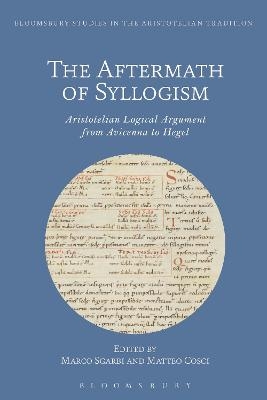
The Aftermath of Syllogism
Bloomsbury Academic (Verlag)
978-1-350-04352-7 (ISBN)
The Aftermath of Syllogism investigates the key developments in the history of this peculiar pattern of inference, from Avicenna to Hegel. Taking as its focus the longue durée of development between the Middle Ages and the nineteenth century, this book looks at the huge reworking scientific syllogism underwent over the centuries, as some of the finest philosophical minds brought it to an unprecedented height of logical sharpness and sophistication.
Bringing together a group of major international experts in the Aristotelian tradition, The Aftermath of Syllogism provides a detailed, up to date and critical evaluation of the history of syllogistic deduction.
Marco Sgarbi is Associate Professor of History of Philosophy at the Università Ca' Foscari, Venice, Italy. Matteo Cosci is a postdoctoral researcher at the Università Ca' Foscari, Venice, Italy, currently working within the ERC project "Aristotle in the Italian Vernacular: Rethinking Renaissance and Early-Modern Intellectual History (c. 1400–c. 1650)".
1. Introduction, Marco Sgarbi and Matteo Cosci (University Ca' Foscari Venice, Italy)
2. Existence and Modality in Avicenna’s Syllogistic, Allan Bäck (Kutztown University, USA)
3. Ideology and “Reception” in Renaissance Logic, Alan R. Perreiah (University of Kentucky, USA)
4. Syllogistic and Formal Reasoning: the Cartesian Critique, Stephen Gaukroger (University of Sydney, Australia)
5. Hobbes and the Syllogism, Douglas Jesseph (University of South Florida, USA)
6. Syllogism in the Port-Royal Logic, Russel Wahl (Idaho State University, USA)
7. Locke and Syllogism. The “Perception grounded” Logic of the Way of Ideas, Davide Poggi (Università di Verona, Italy)
8. Leibniz’s Transformation of the Theory of the Syllogism into an Algebra of Concepts, Wolfgang Lenzen (Universität Osnabrück, Germany)
9. Kant’s False Subtlety of the Four Syllogistic Figures in Its Intellectual Context, Alberto Vanzo (University of Warwick, UK)
10. “Everything Rational is a Syllogism”: Hegel’s Logic of Inference, Georg Sans, SJ (Hochschule für Philosophie, München, Germany)
Index
| Erscheinungsdatum | 03.02.2018 |
|---|---|
| Reihe/Serie | Bloomsbury Studies in the Aristotelian Tradition |
| Co-Autor | Stephen Gaukroger |
| Verlagsort | London |
| Sprache | englisch |
| Maße | 156 x 234 mm |
| Gewicht | 499 g |
| Themenwelt | Geisteswissenschaften ► Philosophie ► Allgemeines / Lexika |
| Geisteswissenschaften ► Philosophie ► Geschichte der Philosophie | |
| Geisteswissenschaften ► Philosophie ► Logik | |
| Geisteswissenschaften ► Philosophie ► Philosophie des Mittelalters | |
| Geisteswissenschaften ► Philosophie ► Philosophie der Neuzeit | |
| ISBN-10 | 1-350-04352-4 / 1350043524 |
| ISBN-13 | 978-1-350-04352-7 / 9781350043527 |
| Zustand | Neuware |
| Haben Sie eine Frage zum Produkt? |
aus dem Bereich


